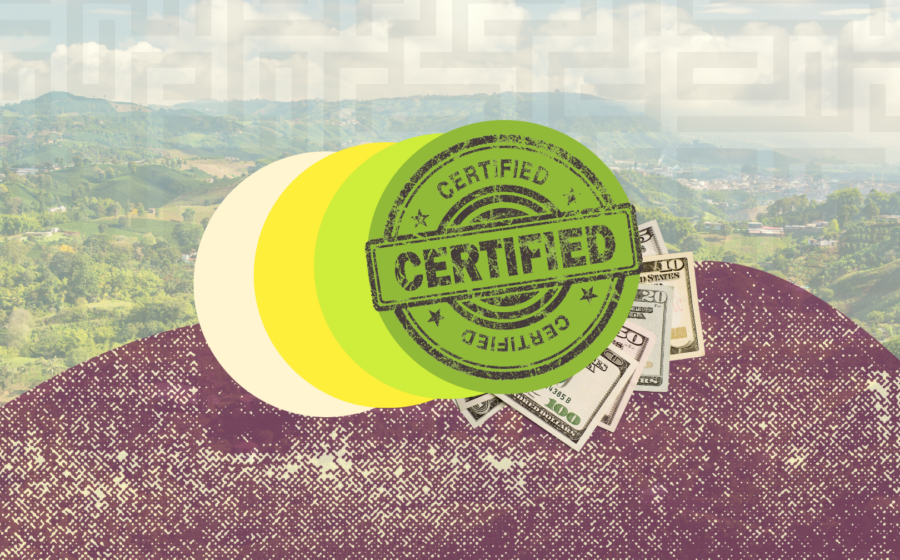Coffee certification programs can be informative—and confusing. Ideally, certification programs enable companies to communicate their values and assure customers they’re upholding a particular set of ideals. But they can sometimes be hard to decipher or parse out. It’s common for companies to display the logos of certification programs on their bags, but does that mean anything to consumers?
We walked through some common coffee certifications and concluded that certification programs can serve a vital purpose but may perplex consumers, especially if customers don’t know what each certification program does.
Now, we’ll look at the practical application of these programs and how coffee shops and farmers contend with navigating these complicated structures. Beyond the struggles consumers might face at the retail level, certification programs can present hurdles for farmers and coffee buyers—but also provide invaluable worth and meaning to the work happening on the ground. Despite their challenges, certifications can act as a catalyst to improve coffee farming and trading processes. We can view these programs critically while still understanding the value they add to the complex and often fragmented supply cycle.
A (Potentially) Arduous Expense
Obtaining a coffee certification can be a lengthy and costly process. “Certification costs may range from a few hundred to several thousand dollars,” reads the USDA Organic website, with fees depending on the “size, type, and complexity” of a business. “Typically, there is an application fee, annual renewal fee, assessment on annual production or sales, and inspection fees.”
Along with fees, there are also labor costs. Becoming a USDA certified organic coffee roasting facility requires companies to keep detailed records of all green inventory, equipment, supplies, importing transactions, roasting practices, and more. Also, the coffee must be certified from the farm to the roastery, which means the roaster must separate all organic coffees from non-organic coffees. Many roasters don’t sell just organic coffees (this would severely limit the range of coffees they could source, effectively eliminating coffees from entire regions of the world) so they have to keep everything separate to maintain their certification: they must roast separately, have separate storage systems, and even use different scoops, bins, buckets, and grinders.
Many certification programs have equally strict—and costly—standards coffee farms must follow. These rigid requirements come with significant expenses that few independent farmers can afford. Countries where cooperatives, or large groups of farmers working together, are common sometimes obtain certifications on behalf of the cooperative. In countries like Peru, Mexico, and Ethiopia, it’s common to see organic or Fair Trade certification representation amongst the cooperative rather than an individual farmer.
Although costly, a certification designation can help a cooperative sell its coffee at a higher price point. However, many small farms already follow organic or environmentally-friendly farming practices but are not certified due to price.
“In my day-to-day work, I see quite a few producers who work organically and believe in organic production, but they are not certified. That’s something you see quite commonly,” says Stuart Ritson of Osito Coffee.
Over the phone, Ritson explained that the barriers to certification are too difficult for most small farmers to overcome. “A farm needs to be organic in practice for three years before it can get the certificate. That’s quite a big barrier. You’ve got to find different alternatives, different ways to run your farm,” he says. “In some cases, this is very complex and expensive, and to do that for three years before you see any of the benefits [is cost-prohibitive].”
Mary Allen Lindemann, co-founder and community builder at Coffee By Design in Portland, Maine, had similar experiences. Coffee By Design is a certified organic roastery, but like many roasteries that carry this designation, sells a mix of organic and non-organic beans. “We don’t only sell organic coffees, we sell sustainably sourced coffees. There are farmers we’ve worked with for years who, everything they do would comply, but they can’t afford the certification.”
Hiccups Along The Way
Most certification programs require participants to recertify their businesses or farms every few years, which can also contribute to them being cost-prohibitive. And hindrances along the way can drive the price up.
In addition to being a USDA-organic certified coffee roasting facility, Coffee By Design also obtained B Corp status in July 2016. Lindemann described the initial application experience as meticulous but positive overall. But the company faced hurdles when it tried to renew its certification in 2019.
“In my day-to-day work, I see quite a few producers who actually work organically and believe in organic production, but they are not certified. That’s something you see quite commonly.” Stuart Ritson, Osito Coffee
When reapplying for Coffee By Design’s B-Corp status (companies are required to reapply every three years), Lindemann discovered that the roastery had been suddenly recategorized to the Agriculture category, which would affect the B Impact Assessment score it would receive. After endless phone calls, hours of assessment, and assistance from the B Impact Clinic at the University of New Hampshire, the company was finally recertified in the correct category.
But the trouble didn’t end there. “Then, while suffering through the pandemic, we received notice that we were randomly selected for an audit,” says Lindemann. “I knew from speaking with one other B Corp business that the audit would be grueling, almost as hard as the initial assessment.”
After asking for more time to prepare, B Lab explained that several businesses had requested certification and audit delays and denied their request. Upon much deliberation, Coffee By Design decided not to renew its B Corp certification.
What’s A Certification Mean If Anyone Can Get It?
Coffee By Design declined to renew its B Corp status early in 2022, just months before news of Nestle receiving B Corp status broke in April of that year. To receive B Corp certification, a company must receive a minimum score of 80 on the B Impact Assessment. Nestle received an 84.
Many in the coffee industry protested Nestle’s B Corp status, citing the company’s history of human rights violations. The non-profit organization Fair World Project penned an open letter, saying, “Nespresso’s abysmal track record on human rights from child labor and wage theft to abuse of factory workers is well documented by the media and NGOs. Indeed, Nespresso’s extractive business model is publicly known to be fundamentally at odds with the ethical and just future B Corps want to build and should have structurally been a barrier to Nespresso’s B Corp Certification.”
Nestle’s B Corp certification sparked a conversation about the weight and meaning of certifications: if a large company accused of actions that B Corp is supposed to be against can garner the certification, what does the certification mean for others?
Many expressed concern, including Glen Lyon Coffee Roasters, a B Corp-certified roastery in the UK. On Twitter, the roastery shared its criticism, explicitly pointing to Nespresso capsules and their environmental impact. B Corp replied, “Becoming a B Corp means Nespresso now has both a verified framework & an influential community holding them accountable to continue to improve their social and environmental performance & be transparent about progress.”
Certified on a Sliding Scale
Certifications are often seen as a binary system: either a roaster, coffee, or farm has them—or they don’t. But as the letter from Fair World Project alludes, many certifications are based on a scoring system. Some companies may score higher than others but receive the same certification nonetheless.
On an episode of “Adventures in Coffee,” a coffee podcast produced by Caffeine Magazine, Ritson explains how Rainforest Alliance grants its certification on a graded system. “They have this system where if you do one or two things and make commitments to do others, then you can get the certificate,” he says on the show. A company can receive certification after passing a specific threshold or criteria, similar to how a passing grade in school is anything above 65—regardless if you get a 90 or a 66.
“We don’t only sell organic coffees, we sell sustainably sourced coffees. There are farmers we’ve worked with for years who, everything they do would comply, but they can’t afford the certification.” Mary Ann Lindemann, Coffee By Design
Rainforest Alliance’s system is designed to encourage participants to keep improving and working towards meeting more of their standards, says Ritson—but it has its limitations. “That’s really great on one hand because it says, ‘we really value people who are aiming to do the things we want them to do, and we want to make it easy to get on board.’ … [but] consumers may not know where a brand is at in the process.” You wouldn’t be able to tell who scored highly and who just skated by when looking at a bag of coffee.
Like Rainforest Alliance, Fair Trade USA has minimum standards that must be met to achieve certification and works with organizations to help them improve and meet more of the organization’s standards. The organization’s FAQ page states, “The process of getting certified is a journey of continuous improvement, but there are minimum requirements that must be met prior to certification.”
Certifications Aren’t A Guaranteed Win For Producers
For farmers, coffee certifications provide the allure of higher prices per pound. But the trade-offs aren’t always equal.
In the “Adventures in Coffee” podcast, Ritson further explains that while organic coffees may receive higher prices (though not guaranteed like a Fair Trade-certified coffee minimum price), organic farming practices can yield less product and require labor-intensive processes that ultimately cost more.
In that same podcast episode, José Posada, a coffee farmer from Colombia, noted that much of the price increase from a certification does not always trickle down to the farmer. “The problem with organic—you can have the certification of organic coffee, but that doesn’t mean someone is paying double or triple the price,” he says. “The certifications are more for middlemen than can actually benefit the farmer.”
“The reality is maybe that money isn’t getting back to the producers,” Ritson reiterated. “Or maybe that the producers aren’t able to even sell their coffee through that system with the price floor because there’s not enough demand for what they’re doing.”
Additionally, certifications may not be a driving factor in a green coffee buyer or coffee roaster’s decision to purchase a coffee—especially since so many roasters have direct relationships with farmers and have infinitely more context and information about the coffees they’re purchasing. Coffee By Design sources, roasts, and sells a wide variety of coffee beans, some of which are certified organic. “For our non-organic certified coffees, we have criteria that may not be certified by a third-party but that customers have learned over the years to trust the research and relationships we’re building with farmers and various importers before we bring any coffee in,” she says. “We could actually prove we were paying those farmers more because of a direct relationship.”
Posada echoes Lindemann’s sentiment, stating in the episode, “Customers can research the relationships a coffee brand has with the farmer … when they have a better relationship, that is going to be better for the coffee grower.”
Not So Simple
Is a perfect coffee or business certification even possible? “There’s a lot of positive thought behind these systems and great intentions,” says Ritson. “I want to recognize that running a system that is effective and 100% true to what it says and does, and it’s able to function with 100,000 or a million micro-producers, is relatively impossible.”
Certification programs provide tools for improving coffee’s supply cycle, from farming practices to the distribution of economic value, and verify the outcomes. All programs of this magnitude will have inherent challenges. But, when the objectives of these tools are communicated clearly, consumers can make an informed decision to purchase the coffee that best aligns with their values.
Lindemann believes communication between roasters and consumers can remedy much of the confusion. “With these certifications, whether people choose to get certified or not, roasters have got to be educated about why farms make the choices they make,” she says. “And they need to have a relationship with their customers to communicate why and why not.”
The more we communicate, the more valuable certifications can be. Instead of using them as a binary assessment, certifications can invite consumers to ask questions and critically engage with the systems and processes involved in getting coffee into their mugs.















